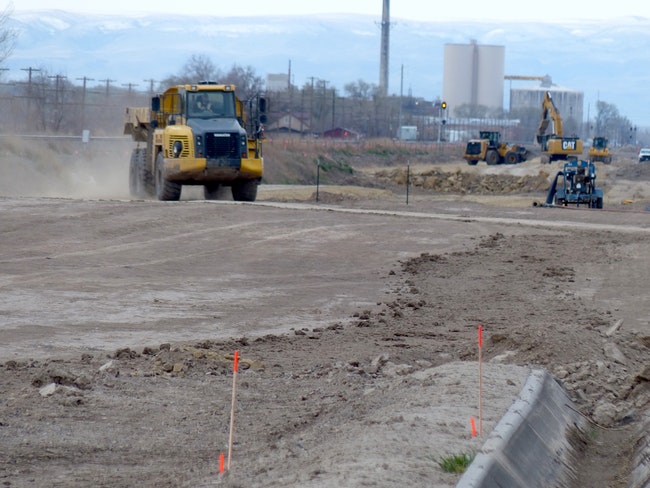
Construction crews work on creating beds for rail tracks at the Treasure Valley Reload Center north of Nyssa on Tuesday, April 12. (LES ZAITZ/The Enterprise)
Greg Smith is giving up on building a “Cadillac” of a rail shipping center, stripping what he called “unnecessary expenditures” in a drive to get the Treasure Valley Reload Center finished.
Smith, Malheur County economic development director, said Tuesday that his focus is on cutting millions from planned costs on the reload center north of Nyssa while still seeking at least $3 million more in public money to finish the work.
But that money, now considered crucial to the project, may not be coming.
Meantime, the project’s lead engineer said he found ways to cut in half a “worst case” cost overrun of $9.8 million listed just two weeks ago.
They still anticipate opening the center this fall so onion producers can put their 50-pound bags of onions on rail cars instead of trucks, cutting their shipping costs.
Changes in the project were presented in a meeting on Tuesday, April 26, of the Malheur County Development Corp. board. The public company was set up by Malheur County commissioners to manage the rail center project.
Smith conceded the project was being scaled down again.
“What we’re doing is taking our Cadillac and creating a Chevy,” he said.
None of the board members responded to whether they had approved buying a Cadillac of a project. That included Grant Kitamura of Baker & Murakami Produce in Ontario, Kay Riley of Snake River Produce in Nyssa, Corey Maag of Jamieson Produce in Vale, Jason Pearson of Eagle Eye Produce in Nyssa and Lynn Findley, state senator from Vale. Riley and Findley didn’t attend the board meeting.
“Right now, my focus is on reducing unnecessary expenditures in our budget,” Smith told the board. “Once we know what the unnecessary expenditures are, and we will look at the revenue side and determine what we need to raise.”
Board members didn’t respond to written questions about if they had earlier approved such expenditures.
At the meeting, Kitamura defended the board and its project and criticized press coverage, referring indirectly to the Enterprise.
“I don’t attribute any of our issues to poor planning,” he said. “I appreciate Brad and Greg scrambling to make changes in our budget and additional financing for funding to complete this project.”
Baird, the lead engineer, explained that the team could trim $5 million from expected costs. That still leaves the project about $4.8 million short of covering expenses to finish even a scaled-down version.
Among the savings described by Baird:
•Drop one of four rail spurs, known as Track C, to save $2.5 million. Project officials say it isn’t necessary now. Smith said it would be postponed for up to three years.
•Cut $1 million from costs to prepare the ground for construction by changing techniques to make wet areas buildable.
•Cut $1 million from the building, which a lone bidder priced at $6.9 million.
• Leave roads in the project unpaved, saving an estimated $500,000.
Baird made clear in an email to the Enterprise on Wednesday that the figures were his firm’s best estimates and that circumstances continue to change.
He told the board that negotiations were underway with the potential building contractor to reduce that cost.
But Baird said that if a deal couldn’t be struck soon, a new round of bidding would be initiated to get a better price. The contract to start construction had been scheduled to be in place by April 14.
The issue of what’s being cut from the project was confused by a board statement last week that suggested three items under consideration to be dropped. Two of them already had been removed, however, before the project hit the $9.8 million cost overrun figure earlier this month.
One was a sewer line running from Nyssa, removed from the project in 2018, and one was a truck scale, still shown on construction drawings but canceled earlier.
That’s why Baird and his team had to look elsewhere to find savings.
Baird said the team also has asked Americold about helping fund the project. The multinational company is under contract to manage the reload center and has a deal to buy it all for $1 if it stays on the task for 20 years.
“They opened up some discussions with us last week about potentially contributing,” he told the board.
In a later email to the Enterprise, Baird explained that Americold “may be able to help cover the remainder, whatever it ends up being once we have a clearer budget picture in the next month or two.”
Baird said such funding and more money from the state could get the project to done.
“If we were able to secure those two sources of funding, we will be able to get everything built with tracks. And make it so there’s some positive developments here with regard to both cost cutting procedures as well as potential additional funding,” he told the board.
In his email to the Enterprise, Baird said, “We have made some good strides to help bring the project into budget, primarily by cuts but also by securing additional funds.”
Smith grew testy under questioning from the Enterprise during the board meeting about his efforts to find more money for the project.
“Let’s be very clear on our approach,” he said. “We’re first reducing unnecessary expenditures. Then we will look at what resources we need to make up the difference.”
 Dan Joyce, Malheur County judge, said in an email on April 20 that the county wanted up to $10 million more from the state for its rail shipping center.
Dan Joyce, Malheur County judge, said in an email on April 20 that the county wanted up to $10 million more from the state for its rail shipping center.
But he confirmed that Findley and state Rep. Mark Owens, R-Crane were immediately seeking $3 million more through an emergency appropriation. The legislators made a modest change to their request recently after county commissioners stepped in.
“We the members of the governing body of the county have an ask of you for help with our reload center based on the need for additional funding,” Joyce wrote the legislators on April 20. He said the need was “due to several factors inflation, timing, severe drought, the list goes on.”
He asked if the two legislators “can see your way clear” to seek $3 million to $10 million.
Owens and Findley two days later asked that the state Emergency Board appropriate $3 million to the project. They wrote to House Speaker Dan Rayfield and Senate President Peter Courtney, who co-chair the Emergency Board.
The Emergency Board, which acts on funding needs when the Legislature isn’t in session, is scheduled to meet in early June but the $3 million request may not make the agenda.
Requests for emergency funding typically go through state agencies and don’t go directly to the board.
“We have not seen any agency notice of intent to bring a request to the Emergency Board related to the Treasury Valley Reload Project,” said Danny Moran, communications director for House Speaker Dan Rayfield. “Consideration of any requests outside of the agency process are at the discretion of the Emergency Board co-chairs, and Speaker Rayfield told Rep. Owens directly that his intent is to return to a regular Emergency Board process as much as possible.”
Smith said Tuesday he hadn’t advanced on two other sources he had identified for potential funding. He said he has not asked the state Transportation Department to add to its budget for the project and he brushed off a question about whether he had sought a special loan from the state’s economic development agency as he had described earlier.
“Why do I need to if I have other funding?” he responded.
Contact Editor Les Zaitz by email: [email protected].
PREVIOUS COVERAGE:
DA orders Malheur County to release records about reload project cost overruns
Rail board cites needs vs ‘wants’ as costs escalate for Nyssa onion shipping center
Experts mum about need for costly extra Nyssa rail spur
Trucks damaging county roads on way to Nyssa reload project
Nyssa project can’t tap state program cited as one source for emergency $9.8 million
Construction on Nyssa reload center could stop unless nearly $10 million added, officials say




